| |||||
| Decades: | |||||
|---|---|---|---|---|---|
| See also: | |||||

This is a list of 1965 events that occurred in the Socialist Republic of Romania.
| |||||
| Decades: | |||||
|---|---|---|---|---|---|
| See also: | |||||

This is a list of 1965 events that occurred in the Socialist Republic of Romania.
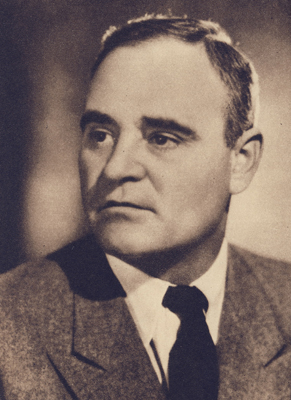
Gheorghe Gheorghiu-Dej was a Romanian politician and electrician. He was the first Communist leader of Romania from 1947 to 1965, serving as first secretary of the Romanian Communist Party from 1944 to 1954 and from 1955 to 1965, and as the first Communist Prime Minister of Romania from 1952 to 1955.

Șerban Vodă Cemetery is the largest and most famous cemetery in Bucharest, Romania.

The Romanian Communist Party was a communist party in Romania. The successor to the pro-Bolshevik wing of the Socialist Party of Romania, it gave an ideological endorsement to a communist revolution that would replace the social system of the Kingdom of Romania. After being outlawed in 1924, the PCR remained a minor and illegal grouping for much of the interwar period and submitted to direct Comintern control. During the 1920s and the 1930s, most of its activists were imprisoned or took refuge in the Soviet Union, which led to the creation of competing factions that sometimes came into open conflict. That did not prevent the party from participating in the political life of the country through various front organizations, most notably the Peasant Workers' Bloc. During the mid-1930s, due to the purges against the Iron Guard, the party was on the road to achieving power, but the dictatorship of king Carol II crushed this. In 1934–1936, PCR reformed itself in the mainland of Romania properly, with foreign observers predicting a possible communist takeover in Romania. The party emerged as a powerful actor on the Romanian political scene in August 1944, when it became involved in the royal coup that toppled the pro-Nazi government of Ion Antonescu. With support from Soviet occupational forces, the PCR pressured King Michael I into abdicating, and it established the Romanian People's Republic in December 1947.

In 2006, Romanian Television conducted a vote to determine whom the general public considered the 100 Greatest Romanians of all time, in a version of the British TV show 100 Greatest Britons. The resulting series, Great Romanians, included individual programmes on the top ten, with viewers having further opportunities to vote after each programme. It concluded with a debate. On 21 October, TVR announced that the "greatest Romanian of all time" according to the voting was Stephen the Great.
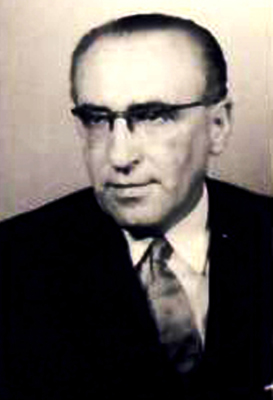
Valter or Walter Roman, born Ernst or Ernő Neuländer, was a Romanian communist activist and soldier. During his lifetime, Roman was active inside the Romanian, Czechoslovakian, French, and Spanish Communist parties as well as being a Comintern cadre. He started his military career as a volunteer in the International Brigades during the Spanish Civil War, and rose to prominence in Communist Romania, as a high-level politician and military official.

Emil Bodnăraș was a Romanian communist politician, an army officer, and a Soviet agent, who had considerable influence in the Romanian People's Republic.
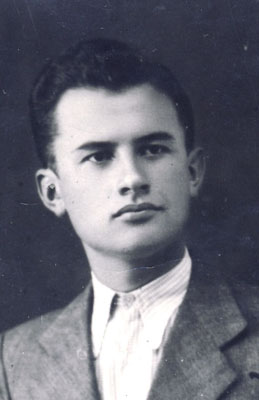
Ion Vincze was a Romanian communist politician and diplomat. An activist of the Romanian Communist Party (PCR), he was married to Constanța Crăciun, herself a prominent member of the party.
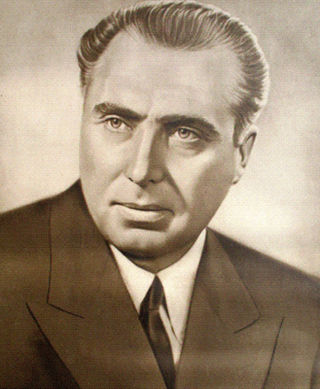
Petre Borilă was a Romanian communist politician who briefly served as Vice-Premier under the Communist regime. A member of the Romanian Communist Party (PCR) since his late teens, he was a political commissar in the Spanish Civil War and a Comintern cadre afterwards, spending World War II in exile in the Soviet Union. Borilă returned to Romania during the late 1940s, and rose to prominence under Communist rule, when he was a member of the PCR's Central Committee and Politburo.
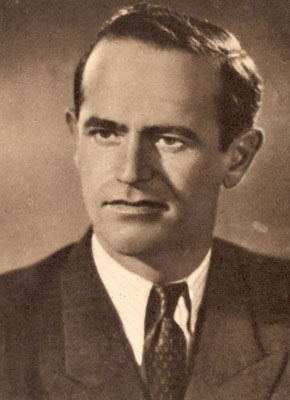
Alexandru Moghioroș was a Romanian communist activist and politician.

Alexandru Drăghici was a Romanian communist activist and politician. He was Interior Minister in 1952 and from 1957 to 1965, and State Security Minister from 1952 to 1957. In these capacities, he exercised control over the Securitate secret police during a period of active repression against other Communist Party members, anti-communist resistance members and ordinary citizens.
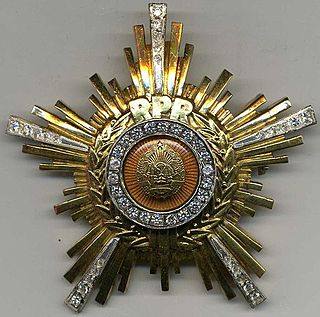
The Order of the Star of the Socialist Republic of Romania, from 1948 to 1965 the Order of the Star of the Romanian People's Republic, was the second-highest honor bestowed by the Socialist Republic of Romania. Established on 12 January 1948, during the regime's first month, it came in five classes:
Events from the year 1961 in Romania. The year saw the creation of the title of President of the State Council for the de facto head of state. The first office holder was Gheorghe Gheorghiu-Dej, who was already General Secretary of the Romanian Communist Party.
Events from the year 1964 in Romania. The year saw increasing separation from Soviet influence.
This is a list of 1967 events that occurred in the Socialist Republic of Romania.

Jilava Prison is a prison located in Jilava, a village south of Bucharest, Romania.